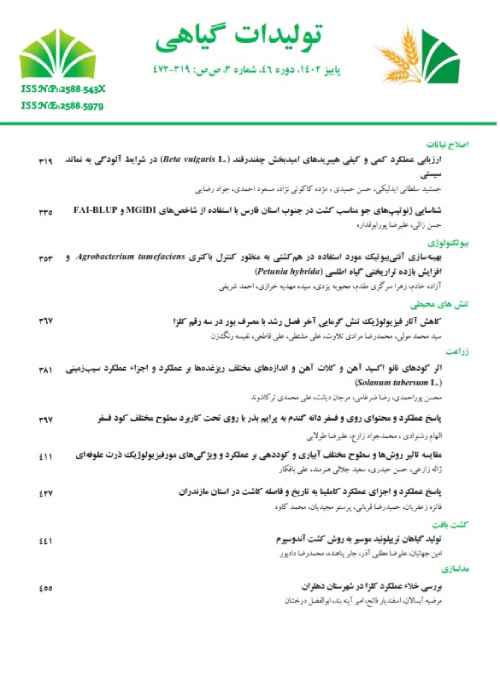Comparison of Carbohydrates and Delta12 and delta15 Genes Expression in Tetra and Hexa Ploid Wheat under Cold Acclimation and Cold Stress
Author(s):
Article Type:
Research/Original Article (دارای رتبه معتبر)
Abstract:
Abstract Background and Objectives Plant cells often increase cold tolerance by reprogramming their genes expression, which results in adjusted metabolic alternations, a process enhanced under cold acclimation (CA). In this study, responses of Carbohydrate alteration and delta12 and delta15 genes expression to cold stress (CS) phases were comparatively studied in three genotypes of bread and durum wheat differing in sensitivity. Two of them (Norstar, bread wheat and Gerdish, durum wheat) were tolerant to CS and the other one, SRN (durum wheat) was sensitive to CS. Materials and Methods Seeds of Norstar (hexaploid, bread wheat) and the two genotypes of Gerdish and SRN (tetraploid, durum wheat) provided by Dryland Agriculture Research Institute (DARI) of Iran were soaked in distilled water and then germinated in Petri dishes on filter paper for 72 h at 25 C in a thermostat. Subsequently, the seedlings were planted in pots. The cooling regime adopted in our experiments allowed us to differentiate the examined genotypes in terms of their tolerance to CS. In our experiment, the plants were moved from control conditions immediately into the acclimated temperature of 4–5 ºC for 14 days with the same photoperiod and irradiance. Leaf samples of genotypes were harvested and analyzed after 14 days under these conditions. After 14 days of CA, the plants were placed into a climatic chamber chilled preliminary to 0 ºC. During further treatments, the temperature was lowered gradually to -5 C (at the rate of 0.5 ºC min-1 ), and the plants were incubated at this temperature for 12 and 24 h. Total cellular RNA was extracted by Biozol method (Fersion Pooyesh, Tehran, Iran) using 80 mg FM leaflets. Applying fermentase reverse transcriptase enzyme instruction, the first strand of cDNA was produced after DNase treatment. Primers were designed using primer 3 to obtain 18–21 bp length. Carbohydrate extraction and determining the carbohydrate concentration were done by 80% ethanol and the AOAC method, respectively. Results These responses confirmed the existence of a wide range of genetic capacity in durum wheat to increase cold tolerance particularly in Gerdish. The findings of the present study showed that under experimental treatments, the carbohydrate content significantly changed so that cold stress in acclimated plants increased sucrose, glucose and fructose contents particularly in Norstar and Gerdish as compared to the SRN plants. Increasing expression of delta12 and delta15 genes under cold stress in Norstar and SRN genotypes in comparison with SRN indicates the capacity of cells in increasing cold stress. Discussion The results may be a sign for associating other metabolite or enzyme activities to create relative tolerance against cold-induced oxidative stress. Also, these responses showed high genetic diversity for cold tolerance in durum. Eventually, assessing the dynamics of cell responses after CS without CA phases could profitably be a novel path in plant stress response investigations in the short run.
Keywords:
Language:
Persian
Published:
Plant Production, Volume:42 Issue: 3, 2019
Pages:
387 to 400
magiran.com/p2073752
دانلود و مطالعه متن این مقاله با یکی از روشهای زیر امکان پذیر است:
اشتراک شخصی
با عضویت و پرداخت آنلاین حق اشتراک یکساله به مبلغ 1,390,000ريال میتوانید 70 عنوان مطلب دانلود کنید!
اشتراک سازمانی
به کتابخانه دانشگاه یا محل کار خود پیشنهاد کنید تا اشتراک سازمانی این پایگاه را برای دسترسی نامحدود همه کاربران به متن مطالب تهیه نمایند!
توجه!
- حق عضویت دریافتی صرف حمایت از نشریات عضو و نگهداری، تکمیل و توسعه مگیران میشود.
- پرداخت حق اشتراک و دانلود مقالات اجازه بازنشر آن در سایر رسانههای چاپی و دیجیتال را به کاربر نمیدهد.
In order to view content subscription is required
Personal subscription
Subscribe magiran.com for 70 € euros via PayPal and download 70 articles during a year.
Organization subscription
Please contact us to subscribe your university or library for unlimited access!


